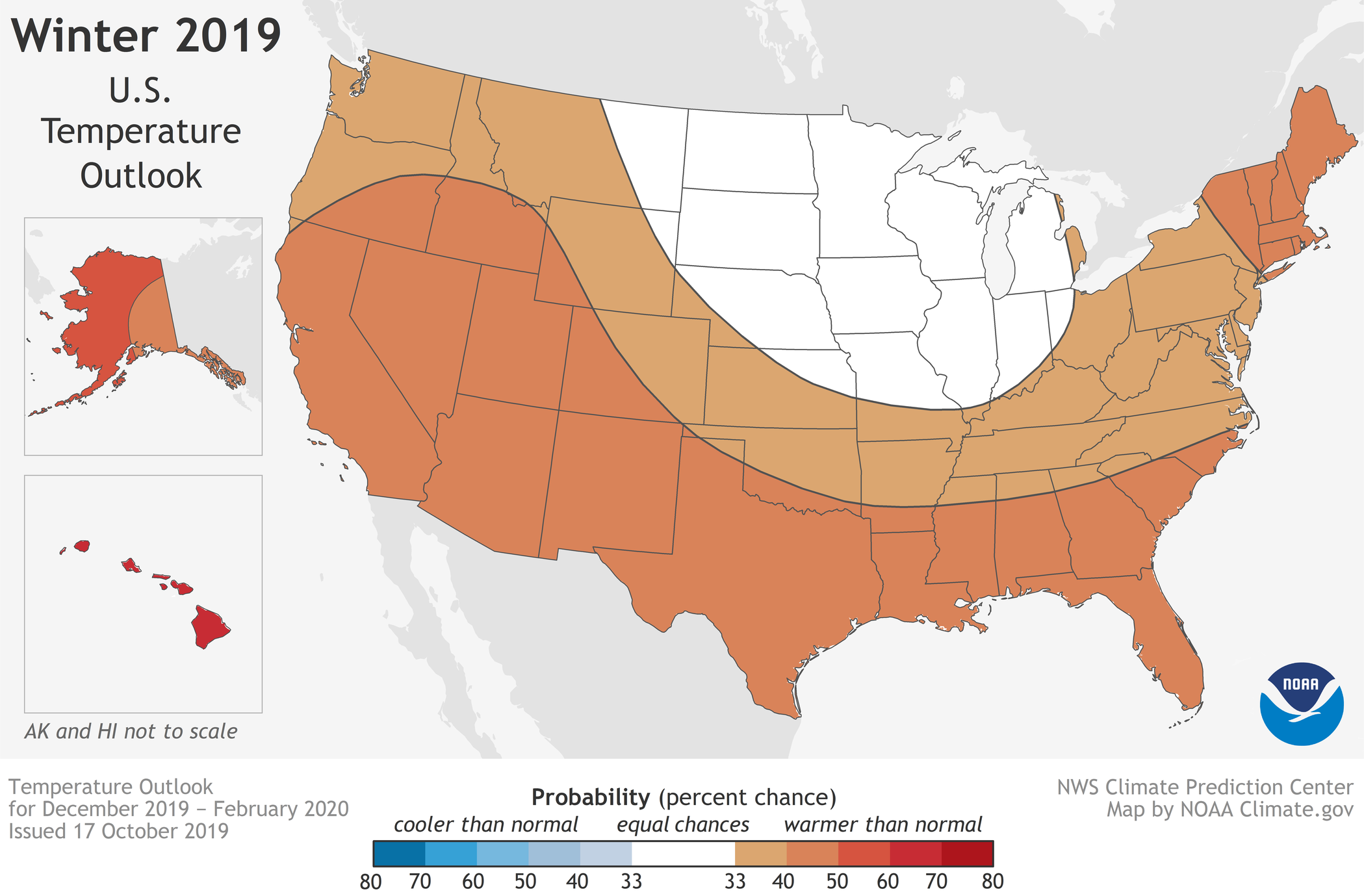Average temperatures, more precipitation predicted for Duluth this winter
Canal Park’s northern light looks on as ice and snow blankets Lake Superior during an arctic winter day in Duluth. (Duluth Stock Photo)
DULUTH, MN -- As residents of Duluth, most of us expect the brutal cold and burying snow of a Northland winter, but newly released projections from the National Oceanic and Atmospheric Administration’s Climate Prediction Center may offer a more accurate picture into what the Twin Ports can expect this winter season.
According to the Climate Prediction Center’s recently released winter outlook, which examines the possible weather conditions from Dec. 1 to Feb. 29, Duluth is potentially in for a wetter, more average temperature winter.
The National Oceanic and Atmospheric Administration’s Climate Prediction Center gives Duluth and much of the midwest equal chances of warmer or cooler than average temperatures this winter. (Map: NOAA)
The report, which was officially released on Oct. 17, indicates that Minnesota, along with most of the upper Midwest, has equal chances of seeing above or below average temperatures this winter.
“As far as temperature, we’re not really looking at particularly strong signal as far as above or below average temperatures,” Kevin Huyck, a meteorologist with the National Weather Service’s Duluth office, said.
Although there is not a strong indication of below average temperatures this winter, Huyck said that Duluth will likely still see cold snaps, like the one that brought record breaking cold to much of the midwest last January.
“It’s very likely that we will see some periods, three, four, five days with some very low wind chills in a stretch,” Huyck said. “And, we will probably have several stretches of that.”
Much to the dismay of students he said that these cold snaps will be shorter, and less extreme than those of last year, meaning we likely won’t be seeing classes canceled for days at a time.
On the flip side, he said that with these shorter stretches of extreme cold, the area will see longer, more sustained periods of average temperatures in between, offering at least some consistency for area residents.
Although these average temperatures are warmer than those below average, it will still be bone-chillingly cold. According to the National Oceanic and Atmospheric Administration (NOAA), the average winter high temperature in Duluth is only 23 degrees, with the hottest winter temperature being only 44 degrees.
When wind chill is factored in, temperatures can quickly approach the low teens, becoming even more dangerous. According to the National Weather Service, if the temperature is 25 degrees and there is a 10 mph wind, the temperature will feel like 15 degrees to your exposed skin. Under these conditions frostbite can occur in under 30 minutes, causing irreversible damage to skin and nerves.
Unfortunately with the winter season, the cold is not all Duluthians have to worry about.
According to the winter outlook, it is likely that much of the Great Lakes will see a wetter winter, which according to Huyck does not necessarily mean more snow.
“When we talk about wetter than normal, that's not to say more rain versus snow, that’s all precipitation,” Huyck said. “So rain or snow or sleet or drizzle or whatever, it all gets binned together.”
With this elevated expectation of a wetter winter, one might assume this means more large, heavy precipitation storms, but Huyck said that the conditions present this season seem to indicate otherwise.
“This type of pattern seems to suggest that we may see more clipper type systems, rather than seeing many large storm systems that come up from the south,” Huyck said. “So perhaps more periods of smaller amounts of precipitation this winter.”
This is not to say that we won’t have at least one or two of the classic Duluth storms that bring heavy sustained snowfall though.
“We’ll still have the big storms,” Huyck said. “It’s something that happens around here and folks should be prepared.”
As for being prepared in the near future, Huyck said residents still have a bit of time to get ready as the recent activity in the arctic makes it unlikely that the Twin Ports will see measurable snow in the next few weeks.
In any case, he made it clear that in the business of weather prediction in the Twin Ports, nothing will ever be absolute.
“Although it is unlikely we see snow or extreme cold in the next two weeks, you still want to make sure you have a heavy coat and mittens and things,” Huyck said. “It is Duluth so you always want to be ready.”



